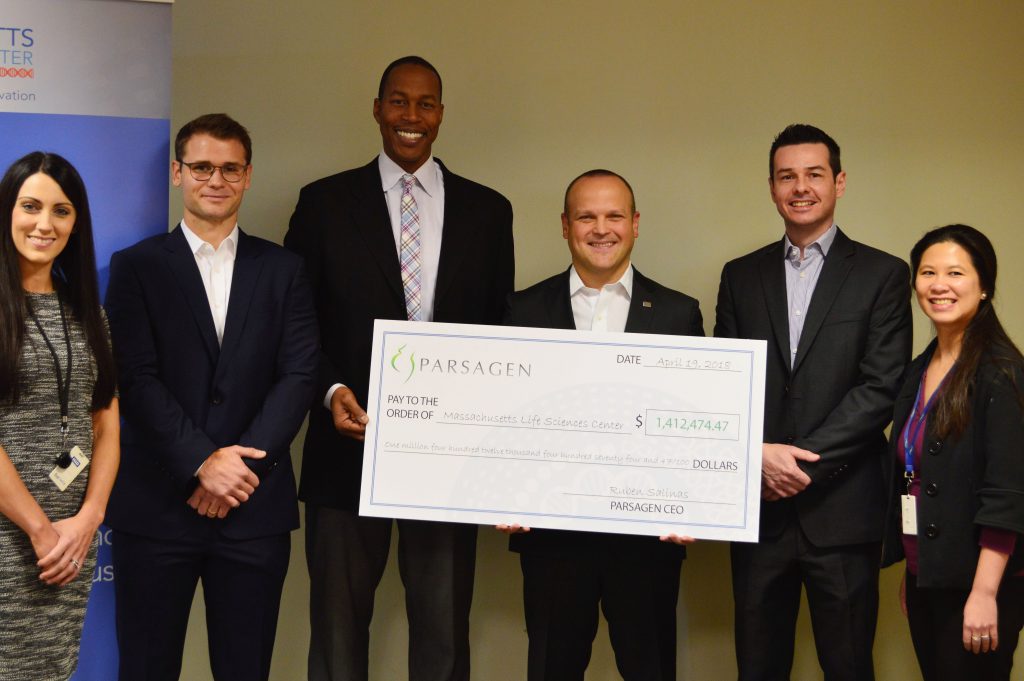Women’s health oriented diagnostics company provides $1 million loan repayment with interest through program to support early-stage life science companies in Massachusetts

WALTHAM – On October 31, the Massachusetts Life Sciences Center (MLSC) and Parsagen Diagnostics celebrated the repayment of a $1 million loan provided to Parsagen through the MLSC’s Accelerator Loan Program in 2015. Parsagen repaid the balance of principal and interest for the loan in April 2018. Parsagen’s repayment to the MLSC totaled $1,412,474.47. The Accelerator Loan Program was created by the MLSC as a funding program intended for early-stage life sciences companies in Massachusetts.
Parsagen Diagnostics, Inc., a QIAGEN company, with a focus on women’s healthcare, developed the PartoSure™ test. Based on the placental alpha microglobulin-1 (PAMG-1) biomarker, the PartoSure test, which is CE marked and was FDA approved in April of this year for sale in the United States, is a novel in vitro diagnostic (IVD) bedside test to aid in the risk assessment of preterm delivery in patients with symptoms of preterm labor.
Funding from the MLSC supported Parsagen’s pivotal clinical trial activities, enabling the company to complete analytical studies and hire additional critical staff members. Overall, the MLSC’s Accelerator Loan Program has funded $22.4 million in loans to 32 companies, which have raised more than $350 million in additional funding. Sixteen of these companies have paid back their Accelerator loans with interest.
“An essential marker to judge a healthy and thriving life sciences ecosystem is by looking at the health and viability of its early-stage companies,” said MLC President & CEO Travis McCready. “Time, resources, and human capital are vital to these companies and Parsagen is a wonderful example of what is possible when we support early-stage ventures aiming to improve patient outcomes. Our support in this regard will not waiver as we enter into the next chapter of the Massachusetts Life Sciences Center.”
PartoSure has been shown in several published studies to have a higher positive predictive value when compared to current diagnostic methods, while maintaining an equally high negative predictive value. The most recent study published in the September 2018 issue of Ultrasound in Obstetrics and Gynecology, found that in the prediction of spontaneous preterm birth within seven days of testing in women with signs and symptoms of preterm labor, the positive predictive value of the PartoSure test was significantly higher than that of current methods.
“Parsagen Diagnostics is focused on addressing the great burden that preterm birth places on families and healthcare systems globally and we are committed to reducing the impact of this condition around the world,” said Ruben Salinas, Co-Founder and former President & CEO of Parsagen Diagnostics and now Vice President, Reproductive Health, at QIAGEN. “A significant number of pregnant women experience symptoms of threatened preterm labor. However, as few as 3 percent of them actually progress to delivering within the seven ensuing days. It is a major challenge for clinicians today to predict which women will actually deliver imminently, especially in the absence of clear cervical dilatation or other relevant clinical factors. Discharging patients home creates the risk of a potentially avoidable adverse outcome, yet prophylactically admitting them for observation incurs considerable costs to the healthcare system and disruptions to the mother and family’s life.”
Parsagen was the third company to repay its accelerator loan in 2018. Accelerator loans bridge the gap in a company’s capital-raising lifecycle, providing the company with time and resources to advance to a point at which it would become a good candidate for private investment. Applicants were early-stage life sciences companies with a high potential for technology commercialization, rapid growth, and private equity financing.
This past June, Governor Baker signed An Act providing continued investment in the life sciences industry in the Commonwealth to invest up to $623 million in bond authorization and tax credits over five years in education, research and development and workforce training. This legislation will serve to reinforce the Baker-Polito Administration’s commitment to ensuring Massachusetts’ leadership in the life sciences sector.
About the Massachusetts Life Sciences Center
The Massachusetts Life Sciences Center (MLSC) is an economic development investment agency dedicated to supporting the growth and development of the life sciences in Massachusetts, home to the most verdant and productive life sciences ecosystem in the world. Through public-private funding initiatives, the MLSC supports innovation, research & development, commercialization, and manufacturing activities in the fields of biopharma, medical device, diagnostics, and digital health. Since its creation in 2007, the MLSC has strategically deployed over $700 million in Massachusetts, through a combination of grants, loans, capital infrastructure investments, tax incentives, and workforce programs. These investments have created thousands of jobs, and propelled the development of new therapies, devices, and scientific advancements that are improving patient health and well-being in Massachusetts and beyond.